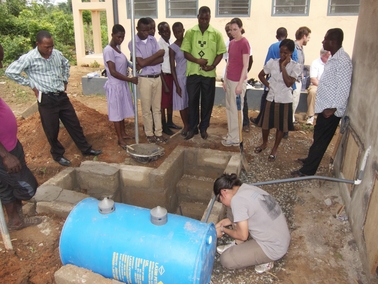
A team of faculty from ASU’s College of Technology and Innovation (CTI) traveled to Ghana in May to install an innovative pit latrine that purifies human waste and generates electricity.
Mark Henderson, professor in the engineering department at CTI, and Brad Rogers, associate professor in the department of engineering technology at CTI, are co-principal investigators on the project and collaborated with Caitlyn Butler, a civil engineering professor at the University of Massachusetts Amherst. Butler developed the primary design and implementation of the microbial fuel cell latrine while Henderson and Rogers supported the global sustainability efforts of the project. The project was funded by a $100,000 grant from the Grand Challenges Exploration program supported by the Bill & Melinda Gates Foundation.
The pit latrine was developed as a response from many rural African communities who experience problems with waterborne diseases because of poor sanitation facilities. In the process, principal investigators designed a system in which liquids are used to generate electricity while solids can be used as compost for farming.